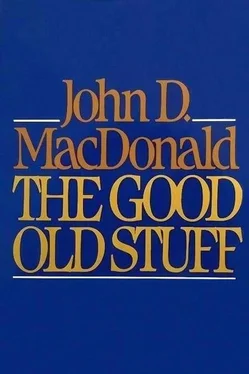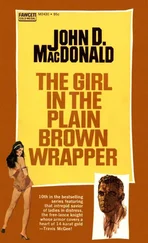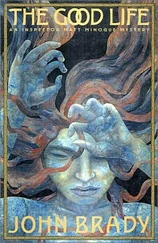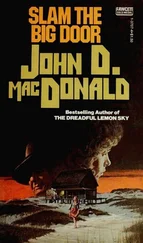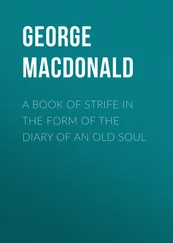As we walked together up the walk, I stuck my hand out to him and said, “Howard Garry. I’m a tourist.”
“Right. Peter Kay mark here.”
We went into the bar, and I followed his lead in ordering a gin and tonic. We took them and carried them over to a table near a window. He sighed, as he sat down, and drank half of his drink in one long gulp.
“How’d you know Conny, Mr. Garry?”
“Oh, she knew a friend of mine that was stationed here during the war. A Captain Dan Christoff. You probably never heard of him.”
“Yes. I remember him. Chap who was drowned. Big stink about that here. Conny complained for weeks.”
I went over to the bar and brought back the second round. We drank it, and Lieutenant Kaymark became a bit flushed. We sat in silence. I was thinking those thoughts that every man has when he sees the body of an attractive woman. What a waste!
After half of the third round was gone, he looked up. “I guess I shouldn’t feel so badly about it. She’ll be off my list now. One less person to watch. Bloody Intelligence unit always loads you up with too many suspected agents.”
“You’re in Intelligence?”
“Five years of it out here. I suppose that if I’d told you that during wartime, they could have shot me for it. But now I’m so bloody sick of it, I wish they’d transfer me out of it. It’s too much of a piece of cake. Nothing to do. Dull.”
I thought it over. A man with the perfect qualifications. And he’d dropped into my lap. It was too good an opportunity to miss. I leaned forward and put my elbows on the table and lowered my voice. “How would you like to have it a lot less dull, lieutenant?”
He shrugged and smiled. “Of course, I’d like it.” He looked amused.
“Suppose I tell you that I think Captain Christoff was murdered? Suppose I tell you that I believe that Conny was murdered? Suppose the fact that she was a suspected agent ties in with it all?”
“Bit thick, what?” He grinned at me as if I was a case to be pitied.
“Don’t smirk at me, lieutenant.” I started with the interviews with the crew members. I gave him the entire story. I didn’t spare any details, and I tried to repeat the conversations as near word for word as I could remember. He sat there, indolent but interested, until I told of my interview with Constance Severence. Then he sat forward, alert and excited. His excitement grew as I told of the China Sea Inn, Guy Wend, and the note. When I finished telling him about the visit from Van Hosen, he leaned back and sighed.
“That tears it, Garry. It’s perfect. Van Hosen is on my list. Originally from Java. Got out somehow after the Japs moved in. Mysterious circumstances. Claimed to have escaped. He does odd-job journalism around the city. Wend is also on my list. Nasty type. Slippery. Always mixed up in radical island politics. A rebel. I’m surprised about O’Dell. Never figured him for that sort of thing. It ties in with Conny beautifully.”
“Then you think I’m right, Peter? You think it’s possible that Dan Christoff got mixed up in some kind of intrigue or spy stuff, learned too much, and was killed?”
He twirled his glass and looked judicious. “I’m certain that you’re right, Garry. You’ve gone about as far as you can go. Let me take it over from here. We’ll work as a team.”
I was delighted. It was the first backing I had received. I was no longer fighting alone and in the dark. “Where do we start?”
“At the January Club. They don’t open until noon. I’ve got some reports to make out on the Severence woman. Suppose I meet you at the club at twelve thirty for lunch. I’m a member there. I had to join. Too many of my suspects flocked around there during the war.”
As we left the hotel, he stopped by a full-length mirror in the hall and made a dozen minor adjustments to his uniform, tugging at the sleeves, straightening insignia, pulling down his blouse. He pulled a small brush and comb out of his side pocket. He brushed his uniform and then carefully combed his hair. He stepped back and took a last look at himself. He smiled at himself. And then we walked out and each took rickshaws in opposite directions.
I arrived at the January Club before Kaymark did. It was a low building with orange-yellow plaster walls and a red tile roof. It was set back from the road behind a screen of thick shrubs and flowering trees. As I walked up the steps, I could see a double row of tennis courts at the side. I estimated that there were twenty courts. A few of them were already in use.
A smiling native in a white uniform met me at the door and directed me to a small cool room to wait for Lieutenant Kaymark. On the small table were copies of the London Times and the New York Times . The latest copy of the New York Times was only nine days old. I was halfway through the front page when I looked up and saw Kaymark smiling down at me.
We went into the pleasant sunny dining room and ordered drinks at the table. I looked over the sprinkling of members at the other tables. I started when I saw the man named Guy eating alone in a corner. I jerked my head in his direction, and Peter looked around. He looked back at me and nodded. “The desk clerk was right, Garry. That’s Wend.”
The other faces were unfamiliar. After the excellent curry lunch we walked back to the cardroom. Two bridge games had started. As we walked in, an old man with a leathery face looked up from his cards and said, “Ho, Peter! Hear about Conny?”
“Saw her. Unhealthy business, this getting drowned, you know.”
“Good a way as any, they tell me.” He grinned and turned back to his cards. His partner had been glaring at him as he talked. We stood and watched the play for a time. I’ve always enjoyed bridge without knowing too much about the finer points of bidding. The table where Peter’s friend was sitting was playing slow, careful bridge. I glanced around at the other table. I saw into the hand of a Singhalese who sat with his back to me and noticed with a start that his cards were unsorted. A heart was played and he, with hearts scattered through his hand, played the king of clubs. The opponents picked up the trick. The man’s partner saw me staring and muttered something. The hand was lowered so that I couldn’t see it, and in a few seconds they all threw their hands in. On the next deal, the man with his back to me sorted his cards properly. I watched for a few minutes. The play was normal. I motioned to Peter, and he followed me out into the main lounge. No one was within earshot.
“Peter, have you ever paid much attention to the game in there?”
“How do you mean? I can afford to watch, but I can’t afford to play. Stakes are a rupee a hundred. Roughly thirty cents in your money. If you lose by two hundred points, which would be a very low score, that’s sixty of your dollars.”
“I don’t mean that. I mean have you ever seen anything odd about the way they play bridge?”
“No.”
I explained what I had seen. “Suppose this was the nucleus of a group of agents. Imagine the efficiency of it. A man has two thousand rupees to pay off. He has instructions to give. They memorize a simple code. There’s twenty-six letters in the alphabet and thirteen cards in a suit. Any red ace is A, and any black ace is B. Any red deuce is C, and any black deuce is D. Any red trey is E, and so on. It would come out even and be easy to remember. They deal new hands until the boy with the message can spell it out. At the end of the game, they fake the score so that he has to pay off. No danger of being overheard. No suspicion.”
“How about the casual person looking in on the game?”
“They were probably a hell of a lot more careful during the war, when they could get hung or shot for it, than they are now. Even if what I saw was out of line, how can I prove anything?”
Читать дальше
